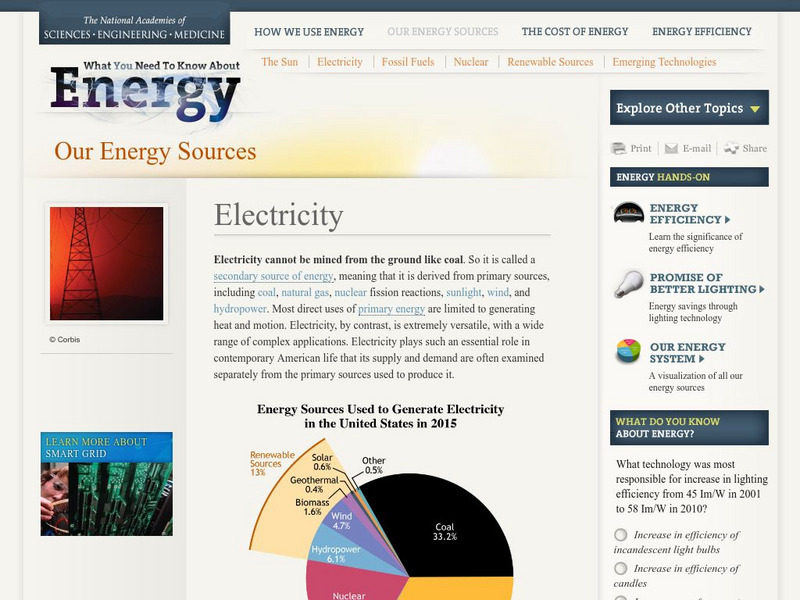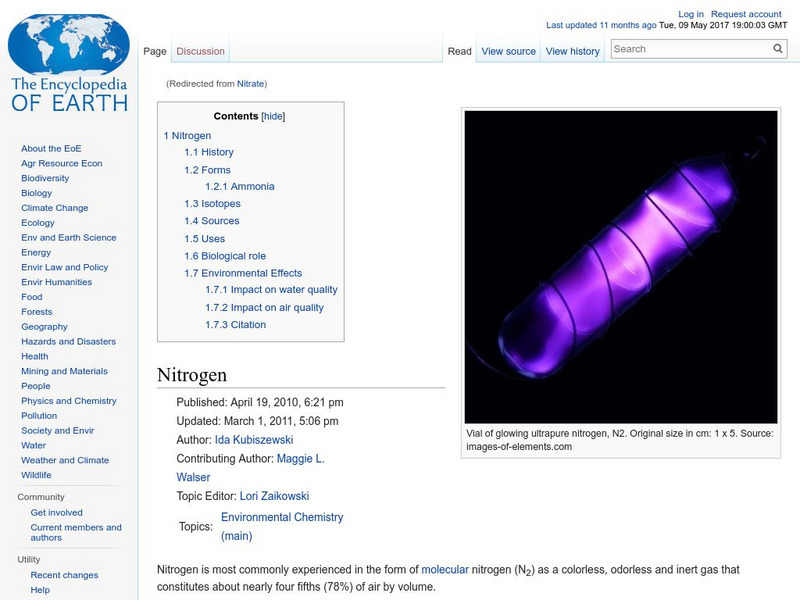National Academies of Sciences, Engineering, and Medicine
The National Academies: Our Energy Sources: Electricity
Electricity is considered a secondary energy source because it is generated from other sources such as water and wind. Learn about electricity demand in the U.S. as well as the challenges we face in the future to continue to provide...
Encyclopedia of Earth
Encyclopedia of Earth: Physics & Chemistry: Nitrate
Discusses the chemistry of nitrate, the negative agricultural effects of too much nitrate in soil and in water sources, its toxicity to plants and livestock, and the impact on human health.
University at Buffalo
Love Canal Collections: Love Canal Chronologies
Find chronologies from three different sources of Love Canal and its chemical contamination. Read about how the investigation of this environmental disaster progressed over the years.
Other
Potty Girl: What You Should Know About Toilets
Toilets are also a major source of wasted water due to leaks and inefficiency. In a home that was built prior to 1993 it is most likely that the toilet uses 3.5 gallons or more for every single flush (in Dekalb County alone, approx....
A&E Television
History.com: How Mesopotamia Became the Cradle of Civilization
Environmental factors helped agriculture, architecture and eventually a social order emerge for the first time in ancient Mesopotamia. Mesopotamia's name comes from the ancient Greek word for "the land between the rivers." That's a...
Indiana University
Indiana University: Sediment Contaminants
This resource, which is part of a learning module, discusses sediment contaminants, problems associated with them, evidence of contamination, and how sediment contamination can be managed.
A&E Television
History.com: Why the Nile River Was So Important to Ancient Egypt
From nourishing agricultural soil to serving as a transportation route, the Nile was vital to ancient Egypt's civilization. The Nile, which flows northward for 4,160 miles from east-central Africa to the Mediterranean, provided ancient...
US National Archives
Docsteach: Birth of the Environmental Protection Agency (Epa)
By the late 1960s, issues of unchecked land development, urban decay, and air, noise, and water pollution came to Americans' attention. In November 1971, the newly created Environmental Protection Agency (EPA) announced a large-scale...
National Institutes of Health
National Institutes of Health: Folate
A dietary supplement fact sheet about folate, which is also known as folic acid or vitamin B9. Learn about how this vitamin functions in the human body and how the body reacts when there is a vitamin deficiency or overdose. Providing...
Energy for Sustainable Development
Kids and Energy: Geothermal Energy
Geothermal energy can be used as an efficient heat source in small end-use applications such as greenhouses, but the consumers have to be located close to the source of heat. Geothermal energy - heat from the earth (in most cases mineral...
Other popular searches
- Water Sources
- Sources of Water Pollution
- Water Sources Grades K 2
- Water Sources K 2
- Activities on Water Sources
- Natural Water Sources
- Water Sources in Qatar
- Types of Water Sources
- Landforms Water Sources
- Streams as Water Sources
- Natural Sources of Water
- Water Sources in Drought







